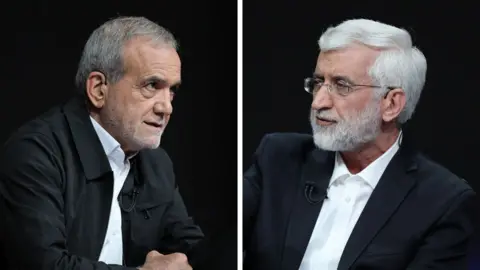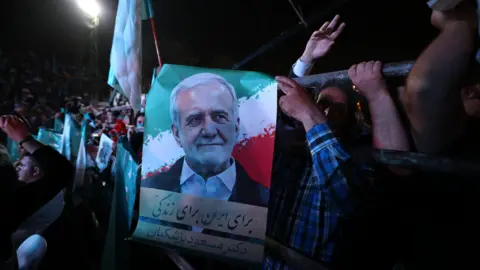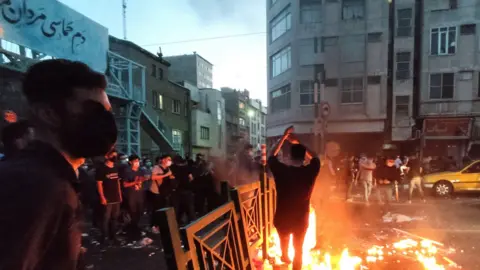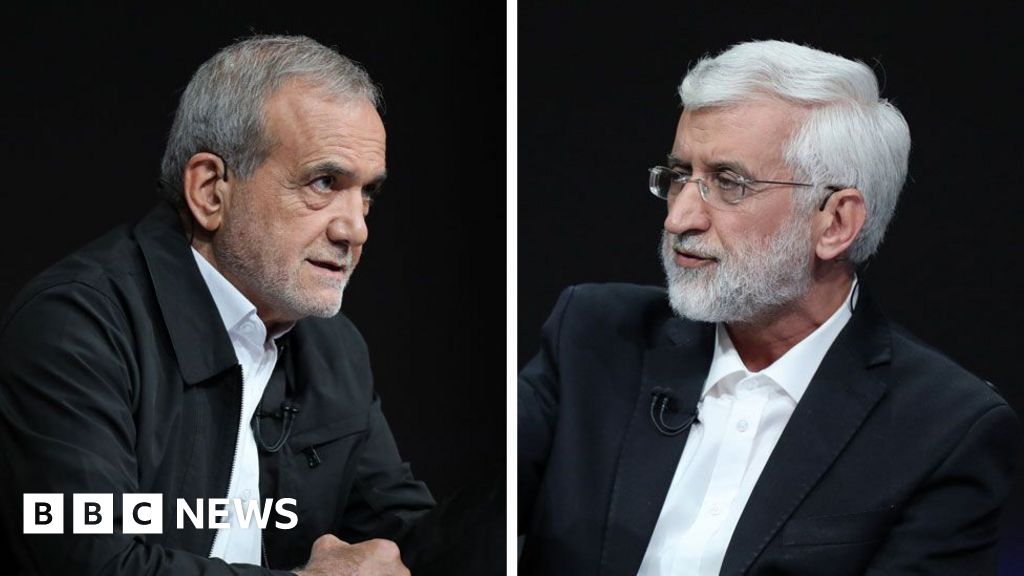By Tom Bennett, BBC News
 Shutterstock
ShutterstockVoting has closed in Iran’s presidential election, with a hardline conservative going head-to-head with a reformist.
The run-off comes after no candidate secured a majority in the first round of the election on 28 June, which saw a historically low voter turnout of 40%.
Preliminary election results are expected to be released by Saturday morning local time.
The vote was called after Iran’s previous president Ebrahim Raisi was killed in a helicopter crash in May, in which seven others died.
One of the candidates, former heart surgeon Dr Massoud Pezeshkian, is critical of Iran’s notorious morality police.
Dr Pezeshkian has caused a stir after promising “unity and cohesion” and an end to Iran’s “isolation” from the world.
He has called for “constructive negotiations” with Western powers over a renewal of the faltering 2015 nuclear deal in which Iran agreed to curb its nuclear program in return for an easing of Western sanctions.
Dr Pezeshkian’s rival, Saeed Jalili, favours the status quo. The former nuclear negotiator enjoys strong support amongst Iran’s most religious communities.
He is known for his hardline anti-Western stance and opposition to restoring the nuclear deal, which he says crossed Iran’s “red lines”.
In order to stand, both candidates had to make it through a vetting process run by the Guardian Council, a body made up of 12 clerics and jurists that hold significant power in Iran.
That process saw 74 other candidates removed from the race, including several women.
The Guardian Council has previously been criticised by human rights groups for disqualifying candidates who are not loyal enough to the regime.
 EPA
EPAAfter years of civil unrest – culminating in anti-regime protests that shook the country in 2022-23 – many young and middle-class Iranians deeply mistrust the establishment and have previously refused to vote.
With turnout in the first round at its lowest since the 1979 Iranian revolution, voter apathy could be a deciding factor in the run-off.
On Iranian social media, the Persian hashtag “traitorous minority” has gone viral, urging people not to vote for either of the candidates and calling anyone who does so a “traitor”.
But Supreme Leader Ayatollah Ali Khamenei has rejected suggestions that the low turnout represents a rejection of his rule.
“There are reasons [behind the low turnout] and politicians and sociologists will examine them, but if anyone thinks that those who did not vote are against the establishment, they are plainly wrong,” he said.
 Reuters
ReutersIn a rare move, he acknowledged that some Iranians do not accept the current regime. “We listen to them and we know what they are saying and it is not like they are hidden and not seen,” Mr Khamenei said.
Within Iran, local media has encouraged people to cast ballots.
Reformist daily newspaper Sazandegi said “the future is tied to your votes” while the Hammihan newspaper said “now it’s your turn”.
Tehran municipality-run daily newspaper Hamshahri published a piece entitled “100 reasons for voting”, while the state broadcaster-run daily newspaper Jaam-e Jam said Iran was “awaiting the people”.



